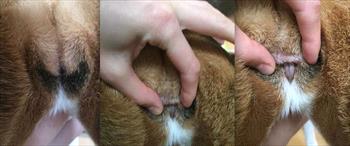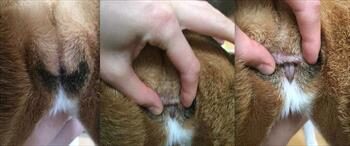Recessed Vulva in Dogs
A recessed (or juvenile) vulva means a dog has excess skin folds that hang over her vulva, enough to potentially cause problems of one kind or another. The skin folds are a structural problem thought to possibly be a genetic issue, but the genetic connection has not been determined. The condition tends to be seen mostly in medium to large-sized breeds, most often in obese dogs.
Some dogs will never have one single problem related to having a recessed vulva, and it will be found during a physical exam or during a procedure for something unrelated. However, some dogs will have life-long problems because the vulvar area collects some moisture when the dog urinates. Combined with body heat in that area, the moisture creates a perfect breeding ground for bacteria and predisposes the dog to urinary tract infections or vaginitis. The vagina is normally not sterile. The bacteria can infect the skin folds, which is called perivulvar dermatitis, move into the vagina causing vaginitis, or move up into the urinary tract, which leads to a bladder infection.
Your veterinarian can diagnose a recessed, or hooded, vulva simply by looking at the genital area, and the vulva is not seen because it’s covered with skin folds.
Clinical signs tend to depend on how much inflammation and infection the dog has. Your dog may scoot on her behind, trying to relieve the itching in her vulva (it may look like a dog scooting because of inflamed anal glands), or licking her vulva excessively.
You may notice a bad odor from her vulva; that odor is usually from infected tissues. Some dogs might leak urine while sleeping or resting due to a condition called USMI, which is a common problem in spayed dogs and could also potentially contribute to a bladder infection (bacterial cystitis).
If she has a bladder infection, you may see blood in her urine, accidents in the house even if she is perfectly housetrained, see her straining to urinate, or notice a foul odor from her urine. It’s possible that her signs of a bladder infection are the only ones you will see if she has a recessed vulva.
Overall, bacterial cystitis is a common medical problem for female spayed dogs (in general) in that many of them may have a bout of bacterial cystitis during their lifetime. Repeated or recurrent bouts of bacterial cystitis are more problematic and it’s important to look for underlying drivers. A recessed vulva could be one of these predisposing causes.

Treatment
If the skin folds of the recessed vulva are affecting both your and your dog’s quality of life, your veterinarian can provide medical management or a surgical fix. Medicated shampoos or wipes may be enough to prevent skin infections. In overweight dogs, weight loss will likely help because there would be less tissue to fold over the vulva. If your dog has not gone through a heat cycle, the recessed vulva might improve after the first heat cycle.
The surgical procedure is called a vulvoplasty. Prior to surgical intervention, it’s important to investigate and look for co-morbid causes for recurrent bacterial cystitis. The evaluation typically includes a physical examination, complete urinalysis, urine culture, possibly a complete blood count, and a chemistry panel. Imaging with radiographs (X-rays) and a complete abdominal ultrasound are also likely to be done. Direct visualization of the lower urinary tract and vagina can be performed with cystoscopy, and this is often done prior to vulvoplasty surgery in order to look for problems such as malformations and other abnormalities.
During vulvoplasty, the surgeon removes a piece of tissue from around the vulva so that the skin has a more normal structure. The new ventilation helps the skin dry out and not be moist enough all the time for bacteria to grow. Additionally, it keeps those skin folds from rubbing up against each other and causing irritation.
You may be provided with analgesics for pain and possibly antibiotics to prevent an infection. Some dogs will need sutures; most types will need to be removed in about 10-14 days at the follow-up appointment.
Before the vulvoplasty occurs, any skin infection near the vulva must be cleared up as it prevents the incision from healing normally, usually by taking antibiotics. A skin culture can determine the most appropriate antibiotic.
Appropriate post-operative care is critical: for two weeks she must be kept quiet with restricted activity, as otherwise during running, jumping, and playing the incision can rip open. That can cause some serious complications. She should be taken outside only on a leash. An e-collar needs to stay on so she will not lick the incision, which also can cause infections.
Rarely, in dogs with significant skin folds, it is possible that not enough skin is removed during the procedure. In this case, the symptoms will likely return. A second surgery can correct it.
Generally, however, the prognosis after a vulvoplasty is excellent and most owners are quite pleased.
